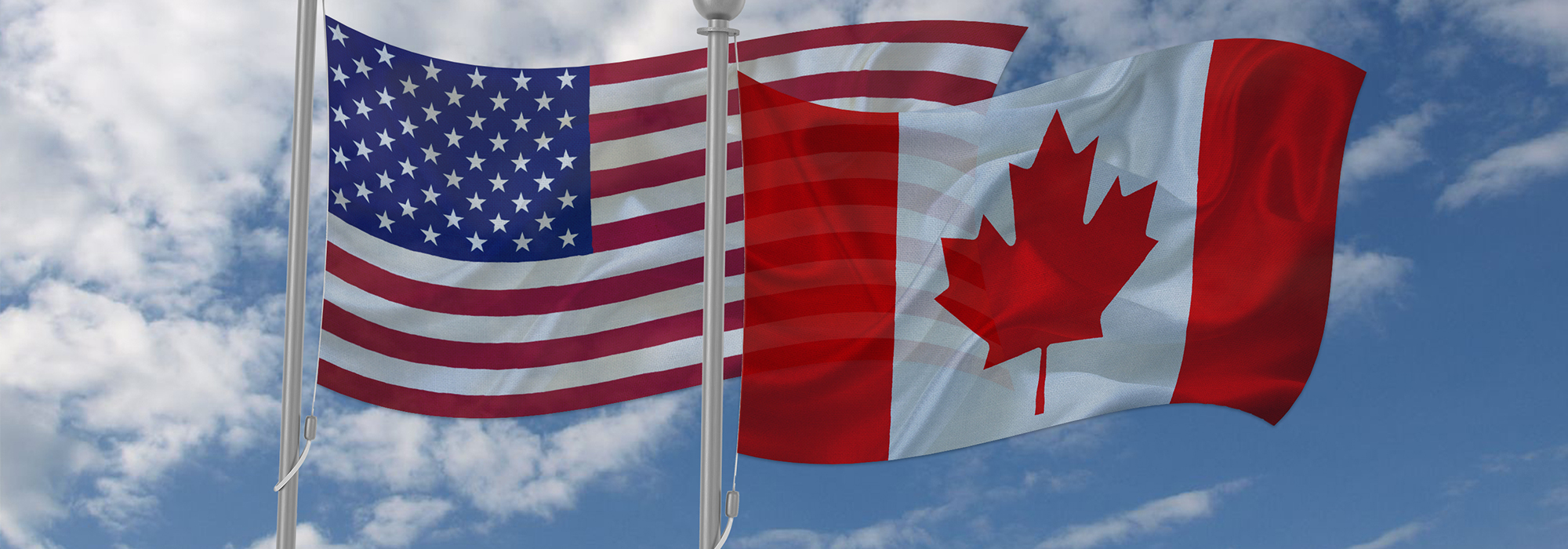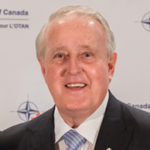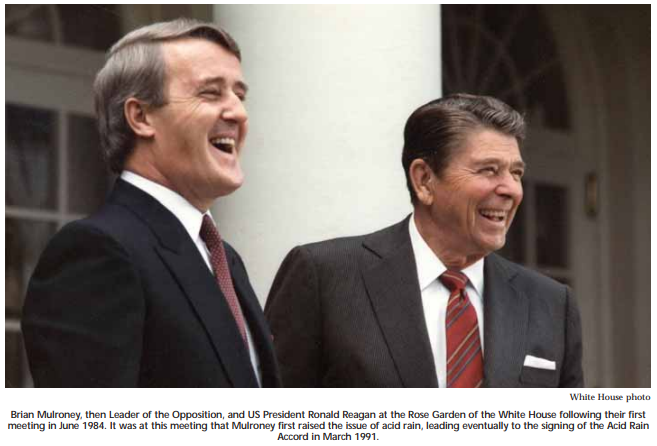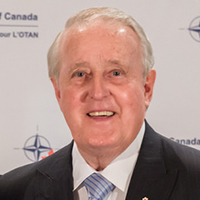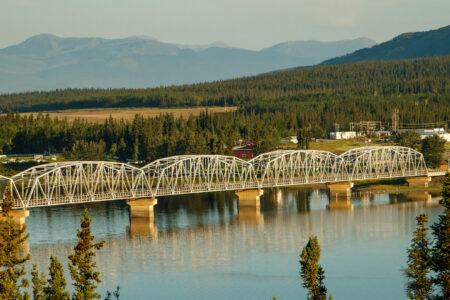
POLICY OPTIONS: Mr. Mulroney, thanks for doing this. March 2011 marks the 20th anniversary of the Acid Rain Accord. When you first met President Reagan in 1984, when you were leader of the opposition, he apparently thought that acid rain was caused by trees. Yet, seven years later, after you stayed at it, you got the Acid Rain Accord, signed on March 13, 1991. How difficult was it to get the Americans to engage on that?
BRIAN MULRONEY: Well, it was extremely difficult. It required constant efforts with two American presidents, perhaps more accurately an American president and then vicepresident, George Herbert Walker Bush, who then became president, of course, in 1989.
There was reluctance by the president because of the science, there was resistance from the business community, the commerce department, because of the costs and, it was, from what I could see, the major irritant between Canada and the United States. When Mr. Trudeau was there, I think it’s accurate to say that there was a demonstration of some tens of thousands of people outside Parliament.
PO: In March of 1981 when President Reagan made his first visit…
BRIAN MULRONEY: President Reagan came to Ottawa. And acid rain was a cover story in all our major magazines, front page stories in our newspapers on a daily basis, pretty well. So, it was a major problem, and we had major difficulties in pushing this through the American system.
PO: At the Shamrock Summit in March of 1985, part of the communiqué that issued from your meeting with President Reagan was on the envoy process of Drew Lewis and former premier Bill Davis of Ontario. How important was that as a step forward in getting Reagan to take it seriously?
BRIAN MULRONEY: Well, it was important for that reason. Until that time, I thought that he was essentially being polite. I raised acid rain with him at every single meeting we had, and there was resistance at every single meeting we had. Significant resistance.
But, by engaging two distinguished people like Drew Lewis and Bill Davis in the process, we elevated it — we moved it to a new level — so that he could not automatically — or I shouldn’t say “he” — the American side could not automatically dismiss the findings and the recommendations. So, that was an important first step that he agreed to take after I became prime minister. But it was key in leading to the ultimate solution.
PO: Vice-President Bush, after visiting you at 24 Sussex in January 1987, famously said, “I got an earful on acid rain.” How much of an earful?
BRIAN MULRONEY: Well, it was pretty tough, because I was at that point negotiating with them on free trade, acid rain, NATO troops in Europe, and so on. We were in constant negotiations with the Americans, and at that point very little was going our way.
When Vice-President Bush came up — he was sent up by the president to see me, because they were aware of the fact that I was pretty furious at the inaction and the manner in which they were constantly skating things off into the boards. The priority that we were giving free trade negotiations in Canada was not reciprocated in the United States. It was being handled by a good man, but at a much lower level. I wanted Jim Baker engaged in this, because without Baker, the treasury secretary and former White House chief of staff in Reagan’s first term, I felt we wouldn’t be able to do the deal.
PO: We’re going to come to that.
BRIAN MULRONEY: That was the kind of resistance then, so I had it out with Vice-President Bush. I knew he was not responsible, because I had been, of course, to meet with him many times. I knew he was an environmentalist. I thought that he shared my point of view, largely, and I knew that if he were Reagan’s successor, we’d eventually get this resolved. But I really unloaded on him, because I knew that this was the only way that I was going to get the message through to the rest of the administration. So, when he said, “I got an earful,” he really did.
PO: And then you were able to get an agreement with the seven provinces east of Saskatchewan to reduce sulphur dioxide emissions by 50 percent. How important was that in your being able to go before the US Congress in 1988 and say, famously, “We ask nothing more than this from you”?
BRIAN MULRONEY: It was very important, because it was the beginning of a Clean Hands Policy, because our opponents in Congress and elsewhere, the administration, would always say, “Yes, we may be somewhat responsible for this, but so are you.” So we decided to develop this Clean Hands Policy, at the end of which we hoped that the Americans would have no such comeback when we said, “The emissions from acid rain are killing our lakes, rivers and streams and forests in Central and Eastern Canada, and you are solely responsible for this. Therefore, you’ve got to put an end to it.” That’s why it was so important.
PO: And you said in that same speech that acid rain fell on both sides of the border, but on the US side it fell from Maine to Michigan, and that it fell on the White House, and it fell on the roof of the United States Congress.
BRIAN MULRONEY: That’s exactly right. And we tried to make the point when I spoke to Congress about the dramatic nature of the ecological catastrophe that was befalling us with this inattention to acid rain, that it was only going to get seriously worse.
What’s interesting now is to look back, 20 years later, and to reflect on the fact that acid rain is rarely — if ever — mentioned in the newspapers, because the matter has been resolved. But in the process of resolution, you can just imagine the new health that’s been given to our industries and our rivers and streams and forests — they’ve been re-energized by this new policy, and that gratifies me a great deal.
PO: Do you think the Acid Raid Accord could in some sense serve as a template for climate change and clean energy in North America?
BRIAN MULRONEY: I do. Certainly, the manner in which we went about it, the persistence we showed, the desire to participate in the resolution of this, rather than just stand on the sidelines and shout at your neighbour, it helps when you engage constructively, doing something yourself. We were able to do that.
When President Bush came in, he called me the day before his State of the Union speech, his first one, and told me that he wanted to come to Canada on his first visit — which we quickly arranged. But he also told me that he had gone to Camp David with a briefing book that dealt with nothing but acid rain. He was determined, I later found out internally; he had spent a lot of time with me and with Canada on this matter, and he wanted it resolved.
The conflict in his term was with people — Bush was an environmentalist, and people like John Sununu, who was his chief of staff, and Dan Quayle, his vice-president, who was chairman of the Competitiveness Council, took an entirely different position on acid rain and felt that the United States could continue to skate us into the boards to their great advantage on this.
Bush reviewed the matter himself, and came down and said, “No, I’m not going to do this. We owe this to Canada. We owe it to the Mulroney government, which has been pressing this issue upon us for five years now, nonstop. And we owe it to our common environment to do this.” That is when the logjam was broken, when he got back from Camp David and decided this and conveyed his decision to the council, to the American government.
PO: When you signed this Accord in the Reading Room of Parliament, of the Centre Block, on March 13, 1991, did you have a sense that this was a big moment?
BRIAN MULRONEY: Yes, I did. For a number of reasons: firstly, the environment, for me, has always been an extremely important policy issue; secondly, acid rain was a big ticket item in Canada that had remained unresolved for years, in spite of the efforts of many to bring it to resolution; thirdly, I had made this a litmus test of the Canada-United States relationship, and had told both presidents Reagan and Bush that we would so regard a resolution of this issue; fourthly, because I thought Canada had taken a mature and somewhat selfless attitude in approaching this by adopting the Clean Hands Policy in advance of resolution; and fifthly, because the manner in which this was resolved I thought at the time would definitively resolve this entire ecological disaster, as I called it, in favour of both countries fairly and once and for all. And it did.
PO: As we look back on it now, years later, it had that beneficial effect.
BRIAN MULRONEY: It also had a psychological effect; it showed that two great countries can deal together on sensitive matters and resolve matters to their satisfaction, as Canada and the US have done for 200 years.
PO: The second big item that came out of the Shamrock Summit in 1985 was the decision to move ahead with free trade negotiations, in 1986 and 1987. But there was a moment right at the end of the negotiations, before there was finally a deal on October 3, 1987, when you called from Toronto on October 1, from a dinner at the York Club — I remember it very well — when you called your negotiating team in Washington and told them to come home. Was that just a negotiating posture? And if not, why was a dispute settlement mechanism a deal breaker for Canada?
BRIAN MULRONEY: Well, because without the dispute settlement mechanism, given the relative and profound imbalance in the size of our economies, the strength of our economies, without that, the Free Trade Agreement could have been used against us on a regular basis and we’d have had no recourse — whatsoever — except to go the route that used to obtain, that is, through American courts or to American quasi judicial panels.
PO: You could spend your whole life in litigation.
BRIAN MULRONEY: You’d spend it all in litigation. The value of the dispute settlement mechanism — I think we used to call it chapter 19. But chapter 19, if you look back on it after 25 years, you’ll see how few matters were brought to the panels, because firstly, it forced people to really put water in their wine to avoid binding arbitration, and secondly, look how often they’ve come down in Canada’s favour, in spite of the imbalance.
I thought it was a condition sine qua non that we had to have and, given the reluctance that was going on and the fact that we were going to run out of time on the special presidential power to negotiate comprehensive Free Trade Agreement for fast track authority, I instructed Simon Reisman to return, and used it as a manner of getting the attention of the American government big time. That happened, and I think it led to the resolution of the impasse and the Free Trade Agreement.
PO: Well, you’re an old labour negotiator. The importance of walking away from the table sometimes is what happens just before you get the deal, isn’t it?
BRIAN MULRONEY: Yes. And you have to do it at the right time and in the right manner. And what happened there (you can see it from Allan Gotlieb’s diaries), the calls immediately started to flood in — “What the hell’s going on? What happened?” — because the Americans, the senior Americans who were involved in this, were of the opinion things were going along quite swimmingly, when in point of fact they weren’t — at all. So, they got a rude awakening that day.
Then, from the night we signed it …
PO: October 3, 1987. A Saturday night, and the hands of the clock were almost literally ticking at five minutes to midnight, the importance being that President Reagan’s fast track authority, which is to say to negotiate a deal up and down without amendments, would expire at midnight.
BRIAN MULRONEY: That’s right. I was at the Privy Council Office that night. Jim Baker came on the phone, and my recollection of it was that he was indicating that everything was pretty well resolved, but that there was no way we could have the dispute settlement mechanism, because it would intrude on and diminish American sovereignty — congressional sovereignty — over international trade. I said, “Well, you know, Jim, that doesn’t make much sense, because every time you sign an international agreement, every time you join the United Nations or you join NATO, we all surrender a little bit of our sovereignty. That’s just the way life is. But if you’re telling me that there’s no deal, that’s fine. Because, you just give me a minute, and I’m going to call President Reagan. It’s Saturday night. I’m going to call him at Camp David and he’s going to want to know why it is that the United States of America can sign a nuclear nonproliferation deal, a reduction deal, with the Soviet Union, their worst enemies, and they can’t sign a Free Trade deal with Canada, their best friends?” Whereupon, Baker, says, “PM, can you give me 20 minutes?” I said, “Sure.”
PO: He didn’t want you to have that conversation with Reagan.
BRIAN MULRONEY: He didn’t want me to have the conversation with Reagan, and 20 minutes later, half an hour later, whatever it was, he called back and said, “The deal is done.”
What I didn’t know at the time is, when Gotlieb’s memoirs came out, apparently Baker, who had a rough time with the American delegation — he had to ram a number of things down their throats, as well — he came into the room in the Treasury Department, where the Canadian delegation was, and he took the Free Trade Agreement, threw it on the table, and his answer was, “There’s your goddamn dispute settlement mechanism.” So, we had the deal.
PO: I remember you being on the phone with Derek Burney that night, saying to him, “Is this better than what we’ve got?” and time stood still for a second.
BRIAN MULRONEY: That’s right.
PO: His answer was, “Yes, Prime Minister,” and then I think you said, “Then go ahead.”
BRIAN MULRONEY: I said, “Go ahead and sign.” There were a small number of Canadians there in the room, from memory, I think, Derek, Stanley Hart, Michael Wilson, Don Campbell, Allan Gotlieb, and Derek Burney.
PO: And Bill Dymond was there, too.
BRIAN MULRONEY: Yes, Bill was there. Of course. A great man. Bill made a very valuable contribution to all of our efforts. Derek had canvassed the others, and everyone was in firm agreement that the Free Trade Agreement as drafted and negotiated that night would be a tremendous boon for Canada economically, and it turned out to be the case.
PO: Selling it to the country proved to be another matter.
BRIAN MULRONEY: [Laughter]
PO: Was the partisan divide of the 1988 election actually what you wanted? A polarization that had you and the Conservatives selling it on one side and all the other opposition parties being opposed?
BRIAN MULRONEY: Well, we recognized that was very helpful to us.
And so we encouraged that as best we could. I’ll always remember when my old friend John Turner said publicly one day that summer that he had instructed the unelected Senate to block the Free Trade Agreement, thereby, of course, freeing me to call an election on it. I was so concerned by what he had done that I took Nicholas to see Bambi. My son Nicholas was about three, I guess, at the time.
PO: The 1988 campaign was quite memorable in that sense, and there are certain echoes of it in concerns about sovereignty being expressed today by the Liberal opposition over Mr. Harper’s talks on border security and a smart border with President Obama. You remember it better than anyone. Our health care was going to be demolished, the cultural industries were going to be destroyed and, most of all, the border would be erased.
BRIAN MULRONEY: Regional development was going to go. Medicare was gone. And official languages would be abolished. These were just some of the losses that we were going to endure, and we would lose millions of jobs, because we were going to be swallowed up by America, and I would be the governor of the 51st state. Of course, none of it turned out to be true whatsoever. What the Free Trade Agreement has done is strengthen Canada’s economy enormously, thereby enhancing our sovereignty, because without economic strength there is no sovereignty possible. And it’s been a great benefit for our country. I’m very proud of it.
PO: It was the forerunner of NAFTA, but that was a negotiation that you had to fight your way into, wasn’t it?
BRIAN MULRONEY: Well, yes.
PO: In 1991.
BRIAN MULRONEY: In 1991, the Bush administration decided that under pressure from President Salinas, they would negotiate a similar pact with Mexico. This filled me with concern because it meant the United States would be in the middle with a spoke into Canada and a spoke into Mexico, but only they would have a bilateral relationship with both. And so I said to President Bush, there’s no way this is going to happen. This is going to trivialize our relationship and diminish the impact of the Free Trade Agreement, and there has to be the three of us negotiating together to bring the equivalent of the Free Trade Agreement to Mexico.
The irony of that, of course, was that again my critics thought that, well, here he’s getting worse. He did a Free Trade Agreement with the United States which, by the way, no one in the US Congress wanted. We had to fight our way to get into that. And also on NAFTA, the Americans tried to exclude us. We had to fight to get into that. And yet the conventional wisdom in Canada, as put out by some of the media and the opposition, was that the Americans were just sitting there waiting to suck poor old Canada into a deal, whereby we would be swallowed up by both the Americans and the Mexicans. None of it was true at all. We had to fight to get in, and I’m glad we did. It’s been very beneficial for Canada.
PO: You’ve often said about the Americans and the relationship between the US president and the Canadian prime minister that we can disagree without being disagreeable. Let me give you two instances where you disagreed with President Reagan, first on the Strategic Defence Initiative, or “Star Wars” (SDI). Can you recall the conversation you had with President Reagan saying you weren’t coming in on that?
BRIAN MULRONEY: Yes, I can. I called a special caucus after a meeting with Cabinet. It was on a Saturday. I know it was a weekend, for sure. I told the caucus our position and then I went upstairs to my office and called Reagan and said, “Now, Ron, I know this means a great deal to you. Canada — my government — thinks this is a very valuable and important matter you’re talking about, but it’s too rich for our blood. We’ve inherited a terrible economic situation, and we don’t have the money to participate in this. But we recognize that you view it as important, and that indeed it is important to your national security. So, we will not be joining SDI, but on the other hand, you’re not going to get any critical comments from the Government of Canada or from me about the nature of SDI. You go ahead with our full support and our good wishes in trying to develop this, and we will remain on the sidelines.”
PO: But in the real world, if he couldn’t deliver the Canadians, essentially it meant that SDI was a dead letter with the rest of the NATO Alliance, wasn’t it?
BRIAN MULRONEY: Well, we thought that it would have an impact, obviously. The other thing, from Canada’s perspective, is that given the polarizing nature of the times, I didn’t want to do anything that would irretrievably place Canada in the American orbit — political orbit — on the international scene, on East-West matters. Therefore I didn’t want the Soviets to be able to point out that Canada was a major player in SDI. And so we did what we did, and I think that worked out, as well.
By the way, President Reagan said, “Well, Brian, I’m disappointed. Very disappointed that Canada won’t participate. But I appreciate the manner in which you’ve done this. You’ve spoken to me before there’s been any reference to the media. I know about it. I’ll alert my guys to this. I appreciate your courtesy in this. We were kind of used to headlines coming at us from Canada with no warning, attacking America and our aims and objectives. The way you put it to me today, if that’s the manner in which it’s articulated later, I can readily live with that, and you and I can work together in the future on other matters.”
PO: The second example being your support and, indeed, your leadership on economic sanctions against South Africa, because of the apartheid regime and Nelson Mandela being held in prison as a symbol of it. You were leading one camp and Margaret Thatcher and Reagan were in another.
BRIAN MULRONEY: That’s right. I wasn’t able to move either of them in any considerable way, in spite of my many efforts. They were no less committed than I was to the eradication of apartheid, but they felt that my insistence on sanctions against South Africa would only cripple the South Africans and not be advantageous to the masses, the working class, in the country. This, of course, ran counter to what we were being told by the ANC.
PO: Mandela himself had quite another view, did he not?
BRIAN MULRONEY: Yes, indeed he did. When he came out, Mandela said that he supported what we had done 100 percent and that he considered that Prime Minister Thatcher and President Reagan were completely wrong on this. But we hadn’t heard from him personally, obviously, while he was in jail.
But to that, both Mrs. Thatcher and Reagan would say, yes, but the ANC are a bunch of Communists. It’s a Communist-dominated organization, and so on. I said, “Well, how do you know that?” “Well, Mandela’s a Communist.” “How do you know that? Have you talked to him? He’s been in jail for 27 years. How would you know what he is?” And so they developed this Communist argument, and I would take the position that, look, if I were Mandela and had been in jail for 27 years, and that the only people coming forward to help me — my organization — financially and in any other way, were Communist countries like Cuba or Libya, I’d accept their assistance. I’d accept their assistance 100 percent And if you wanted to call me a Communist for that, go right ahead. That’s Mandela’s position, I’m sure of it. And I said he’s not a Communist. We’re going to find out that any ideas that you have in that regard are going to turn out to be wrong.
So we fought that battle very strongly, as you know, over many years. Finally, when Mandela came out, one of the first calls that he placed — one of the first calls I got — was to me saying that he had heard, when he was in prison, on the BBC shortwave, that a young Conservative prime minister had taken over in Canada and had lead the Commonwealth to this sanctions policy, and that, because of his gratitude, he would like to make his first visit to a democratic country Canada, to speak to Canadians and to thank them and their government for what they had done on his behalf. That was very gratifying. As you may remember, it was a wonderful occasion when he came to Ottawa in 1990.
PO: June 1990, and he endorsed the Meech Lake Accord.
BRIAN MULRONEY: That’s right.
PO: On that one, you were essentially John Diefenbaker’s heir, weren’t you? BRIAN MULRONEY: That’s right. Mr. Diefenbaker began it all, I think in 1961, when, at a Commonwealth conference, he — Mr. Diefenbaker — moved for the expulsion of South Africa from the Commonwealth. I’ll always remember these little anecdotes of life. But Diefenbaker said that day – in London, I guess it was — “We’ll keep a light in the window for South Africa.” He left London and came back to Ottawa for a Progressive Conservative convention, and I was one of the delegates there to cheer him on his arrival at the Chateau Laurier. He showed great leadership.
PO: I don’t know whether it was you or someone around you, perhaps Derek Burney, who said the only way for Canada to get the attention of the Americans is with big ideas.
BRIAN MULRONEY: That’s right. And a prime minister who will be unrelenting in his pursuit of those limited objectives, and so, as a result, I served as prime minister for nine years. The most important file on my desk and on the desk of any prime minister of Canada is the Canada-US relationship.
During that time, in terms of big ticket items, we achieved the following: the Canada-United States Free Trade Agreement, the North American Free Trade Agreement, the Canada-United States Acid Rain Treaty and the Canada-United States Arctic Sovereignty Agreement. Those are four big ticket items that we were able to resolve that have withstood the test of time for Canada — in nine years.
PO: And in fact, Reagan, on the Arctic sovereignty issue, began with a different view. I think he said, “That’s not the map of the Northwest Passage that they showed me on Air Force One, Brian.”
BRIAN MULRONEY: That’s right.
PO: This was in April 1987, and you were showing him a globe in your office, right?
BRIAN MULRONEY: That’s right. Colin Powell, who was then his deputy national security adviser, was with him, and later told the story.
PO: Their view was that the Northwest Passage was the open sea and our view was that it was our waters, right?
BRIAN MULRONEY: Right. I said to him in my office, “There it is, Ron. This belongs to Canada. Lock, stock and icebergs. This is it.” And it was after that, by the way, down at 24 Sussex, where, according to the taped interviews given by Frank Carlucci, who was then the national security adviser himself, he indicated that Reagan got angry with the American delegation, and said, “want this matter resolved now. And you do it.” Carlucci came running out in 24 Sussex looking for Derek Burney, and when he found him, he said, “Derek, what is your position on Arctic sovereignty, acid rain and free trade?” and Derek said, “Well, why do you want to know?” He said, “Because they’re our positions now.”
There was a classic illustration of what can be done. Colin Powell always used to say that the Arctic resolution matter came about because Prime Minister Mulroney had a Rube Goldberg map in his office of the Arctic.
PO: Reflecting on, if you don’t mind, relationships between presidents and prime ministers going back to, say, Franklin Roosevelt and Mackenzie King: They happened to be the longest-serving president and prime minister. They were both in office during the Great Depression and both in office during the Second World War. Taking that as the starting point, where do you think that the Mulroney-Reagan/Bush years could fit, in terms of interpersonal relations between the two principals and in terms of achievement?
BRIAN MULRONEY: Well, I think that Roosevelt and King had a good relationship and that considering they were war years, much was achieved. I think that Mr. St-Laurent had a good relationship. He concluded the St. Lawrence Seaway agreement with Eisenhower. Mr. Diefenbaker, as we know, really didn’t have a great relationship down there.
PO: Not with Kennedy, that’s for sure.
BRIAN MULRONEY: Not with President Kennedy. Then we had Pearson and Kennedy, who got on very well, and Pearson and Johnson. That didn’t go very well. And then Trudeau with a number of them. I think Mr. Trudeau did well in his relationship with Gerry Ford. Less well, of course, with President Nixon and President Reagan.
PO: Let me rephrase it. How important is it that the president and the prime minister be on a first-name basis, as you were from the moment of your first meeting with Reagan. As Diefenbaker wrote in his memoirs, he was on an Ike and John basis with Eisenhower, and that the phone was right there. How important is that?
BRIAN MULRONEY: Well, it’s not just the question of the first-name relationship. It’s being able to leverage it to get big things done. It’s not just the question of the prime minister with the president. You’ve got to work at it.
The majority leader of the United States Senate, in my time, George Mitchell and Bob Dole, I had both of them come to Canada on the equivalent of ministate visits. I had them to 24 Sussex, I had lunches for them. We really courted them — obviously. I would go down and see Bob Michael in the House and Tip O’Neill, and Newt Gingrich and people like that, and I would see the interest groups, and the leaders of the media — Kay Graham and Ben Bradlee, and so on.
PO: Is it fair to say that if the principals engage, the system engages?
BRIAN MULRONEY: There’s the key point. If you have that kind of relationship with the president and you come together for a meeting, that summit energizes the entire system. It sends a signal out to the American bureaucracy that the president likes the prime minister, the president wants America’s interests to be advanced through greater harmony with Canada, and if they want their careers to move, they’ve got to get going quickly. It is the intensity of those meetings that provokes the policies that result in agreements, because they see that the president is saying to the prime minister, who then says “I want this done.” Look at President Reagan’s diaries, the number of times he says, “I want this done for Canada,” and the times he said it publicly.
So, I think that it’s a very complicated and tricky relationship down there that requires an enormous amount of attention and sensitive work by the prime minister himself. It’s not something that he can delegate to assistants and to advisers. He’s got to do much of it himself, and he has to have the instinct. He has to understand that if he doesn’t get the Canada-United States relationship right, very few big things are going to happen to his time in office.
Now, it happens if you’ve got great ambassadors like I had when I was there, people like Allan Gotlieb and Derek Burney and John de Chastelain. These people were outstanding. On their own they made things happen because of the respect and the regard in which they were held in Washington. So, you pull it together and we had a good team.
PO: How do you think that Stephen Harper and Barack Obama are doing?
BRIAN MULRONEY: From what I can see, they get along well. They do well together. The body language is good. I was there in Washington just the other day. I had dinner with Senator John Kerry, who is chairman of the Foreign Relations Committee of the United States Senate. He confirmed my impression that the Canada-United States relationship was back on a sound footing.
PO: And this Beyond the Borders conversation that we’re having with the Americans now, does this qualify as a big idea?
BRIAN MULRONEY: I think it does. We’ll see when and what comes out of the hopper. But from what I have heard and seen so far, Prime Minister Harper and President Obama are pursuing a big idea. There will be no shortage of opposition in the Congress and here at home, there will be the usual outcry about selling out our sovereignty. I’ve been to that movie before.
PO: To end on a personal note, you’re going to be turning 72 in March. What are your thoughts on where you are in your life, and how is your health? You learned last fall that you had diabetes. How are you doing with that?
BRIAN MULRONEY: Well, Mila and our four kids and our seven grandchildren are all in great shape, and it’s a very happy time in our lives. When I was told I had diabetes, I had some psychological difficulty at first getting my mind around it, and around the idea of injecting myself in the stomach several times a day. But compared to what young people with diabetes go through, it’s nothing. And thanks to insulin, and two great Canadians, Banting and Best, I’m still here. Still alive.
Photo: Shutterstock, by byktzgl
Do you have something to say about the article you just read? Be part of the Policy Options discussion, and send in your own submission. Here is a link on how to do it. | Souhaitez-vous réagir à cet article ? Joignez-vous aux débats d’Options politiques et soumettez-nous votre texte en suivant ces directives.



